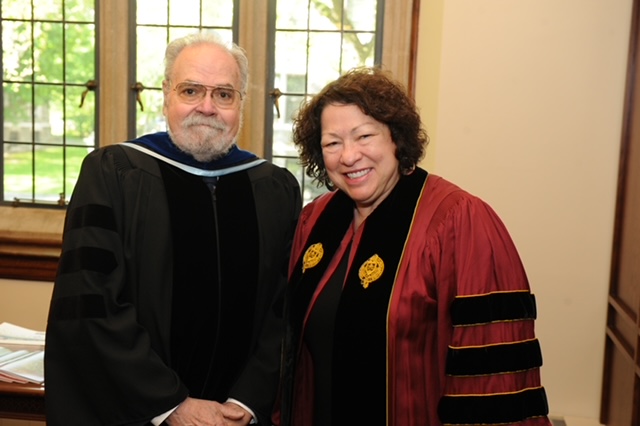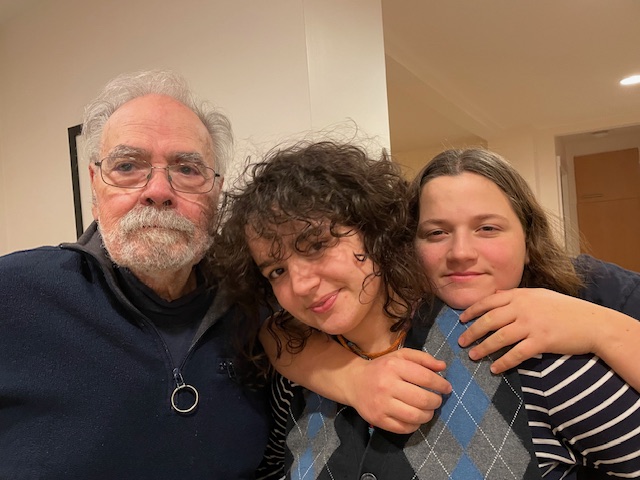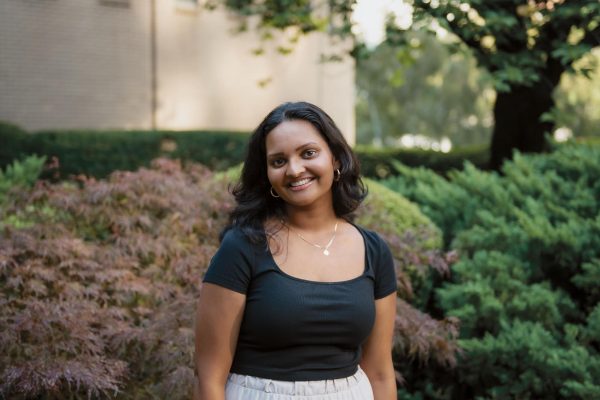Orlando Rodriguez — professor emeritus of sociology at Fordham who advocated for restorative justice and peace in the wake of losing his son in the Sept. 11 attacks — died on Jan. 4 in a nursing home in White Plains, New York, following his battle with Parkinson’s disease. He was 81 years old.
Born on Feb. 22, 1942 in Havana, Cuba to Marta Iglesias, a seamstress, and Jesus Rodriguez, a cracker salesman, Rodriguez and his parents later immigrated to New York City in 1955 — when he was 13 — where they were united with his maternal uncle, Francisco Iglesias.
An alumna of the New York City public school system, Rodriguez graduated from Samuel J. Tilden High School in East Flatbush, Brooklyn and later completed his undergraduate studies at the City University of New York in 1965, where he earned a Bachelor of Arts degree in sociology.
In 1974, Rodriguez completed his doctorate in sociology at Columbia University. He went on to begin his teaching career at Brooklyn College before serving as a researcher at the Vera Institute of Justice in Brooklyn where he researched about released prisoners’ paths to re-entering the job market and other topics related to criminal justice reform.
“I remember that day he was asking ‘do you have a lift back to the city? Do you have a way home?’ He was concerned about other people even as he did not know where his son was.”Jeanne Flavin, professor of sociology
The bulk of Rodriguez’s professorship, however, was at Fordham University, where he spent three decades teaching, mentoring and paving the way for an approach to the field of criminal justice and sociology that centers restoration over punitiveness.
Rodriguez served as a senior research associate at Fordham’s Hispanic Research Center in 1987, where he conducted studies on mental health in Latino communities. He was the center’s director from 1990 to 1997. Between 1990 and 2020, Rodriguez was a professor in the university’s department of sociology and anthropology and served as the department’s chair at one point. Rodriguez was a crucial player in establishing the Peace and Justice Studies minor program and criminology course Harm and Justice, Crime and Punishment.
When Jeanne Flavin, professor of sociology, first met Rodriguez, she was a recently tenured colleague of his at Fordham Rose Hill, where their offices were located next to one another in Dealy Hall. She recounted first coming to know Rodriguez on Sept. 11, 2001, when they first caught wind of the attacks. Rodriguez’ son, Gregory, worked on the 103rd floor of the World Trade Center. Nevertheless, Rodriguez’s immediate reaction was to inquire into the well-being of others, Flavin shared.
“I remember that day he was asking ‘do you have a lift back to the city? Do you have a way home?’ He was concerned about other people even as he did not know where his son was,” she said.
In the aftermath of his son’s death in the Sept. 11 attacks, Rodriguez and his wife of 58 years, Phyllis Rodriguez, penned an open letter titled “Not In Our Son’s Name,” in which they encouraged the U.S. government to avoid drastic military measures and instead adopt a “rational response that brings real peace and justice to our world.”
The letter garnered widespread media attention. Rodriguez connected with other victims’ family members and peace activists across the globe. The letter was included in Howard Zinn’s “Voices of a People’s History of the United States,” was publicly read by actor American Benjamin Bratt in 2007, featured in the 2009 film “The People Speak,” and was the subject of a 2015 documentary “In Our Son’s Name.”
Phyllis stressed that after Sept. 11, Rodriguez utilized his sociological imagination to improve the well-being of others.
“He used the tools of his training in education to do some good for others, he taught on terrorism and society, got the peace and justice studies to become a minor concentration and led him to teach in the prison,” she said.
“He helped me believe in myself when I didn’t always believe in myself, he offered a mirror for me to appreciate myself in ways that I maybe didn’t.”Stacy Torres, FCLC ’02 and assistant professor of sociology at the University of California, San Francisco
Flavin emphasized that Rodriguez’s work normalized approaches to criminal justice that weren’t inherently punishment oriented, but instead stressed the importance of allowing people second, third or even fourth chances.
“It was kind of this larger commitment; we’re not going to punish our way to a better tomorrow, we’re only going to get so far by responding to violence with more violence,” Flavin said. “It’s a really powerful thing to have a senior colleague who takes that position.”
Flavin also underscored that Rodriguez fostered a communal and supportive environment within the sociology department at Fordham, among his colleagues and his students.
“He made it okay to care about your colleagues. He was always profoundly professional, but he made it okay to let your colleagues know that you cared about them and you think about them,” she said. “He carved out a space to see people in their larger capacity as human beings and not only students or co-workers.”
“He carved out a space to see people in their larger capacity as human beings and not only students or co-workers.”Jeanne Flavin, professor of sociology
Stacy Torres, Fordham College at Lincoln Center ’02 and an assistant professor of sociology at the University of California, San Francisco, said that Rodriguez was a major source of support for her while she navigated caretaking responsibilities for her three younger sisters and conflict at home during her junior and senior years at Fordham.
“Those two years, I really feel if I did not have the support of Orlando, I don’t really think I would’ve made it,” she said.
She also shared that Rodriguez flagged different opportunities such as fellowships and graduate programs. Torres credits him as a model of mentorship both professionally and personally, inspiring her to practice empathy.
“He helped me believe in myself when I didn’t always believe in myself, he offered a mirror for me to appreciate myself in ways that I maybe didn’t,” she said.
Julia E. Rodriguez, professor of history at the University of New Hampshire, and daughter of Orlando and Phyllis Rodriguez, recalled her father’s habit of cutting articles out of The New York Times’ print copies to share with his classes in the hopes of instilling media and social literacy skills, inadvertently influencing her path to academia. In her current professorship, Julia finds herself employing a similar tradition with her students.
She reflected on chats with her dad on politics while on a trip in Madrid where she was embarking on her research project.

Julia noted that her parents were always committed to making the world a better place, but in the days following Sept. 11, they saw an opportunity to propel a positive and affirming message about peace. For her father — she believes his actions were a natural way to process the events and harness his scholarly background to rationalize her brother’s passing.
“Instead of anger or desire for revenge, we would rather encourage people to visualize a world where there’s no more terrorism and no more killing, where people don’t lose their family members in such a tragic way,” she said.
Julia stressed her father’s love for teaching at Fordham, noting he remained in his professorship until age 78.
“He just really loved teaching and loved his colleagues at Fordham,” she said.
His family, colleagues and students remember Rodriguez’ dry humor, quiet grace and desire to uplift others through hardship. Rodriguez was a member of the Memorial United Methodist Church in White Plains, NY, and Braver Angels, an organization which promotes civil conversations across political differences.
A private burial was held on Jan. 13 at White Plains Rural Cemetery. A public memorial service will be held in spring of 2024 according to a memorial written by Phyllis and Julia. Donations in Rodriguez’s memory can be made to Rising Hope or September Eleventh Families for Peaceful Tomorrows.
Rodriguez is survived by his wife, Phyllis Rodriguez; daughter, Julia E. Rodriguez and her husband Charles B. Forcey; daughter-in-law, Elizabeth Soudant; and three grandchildren.


